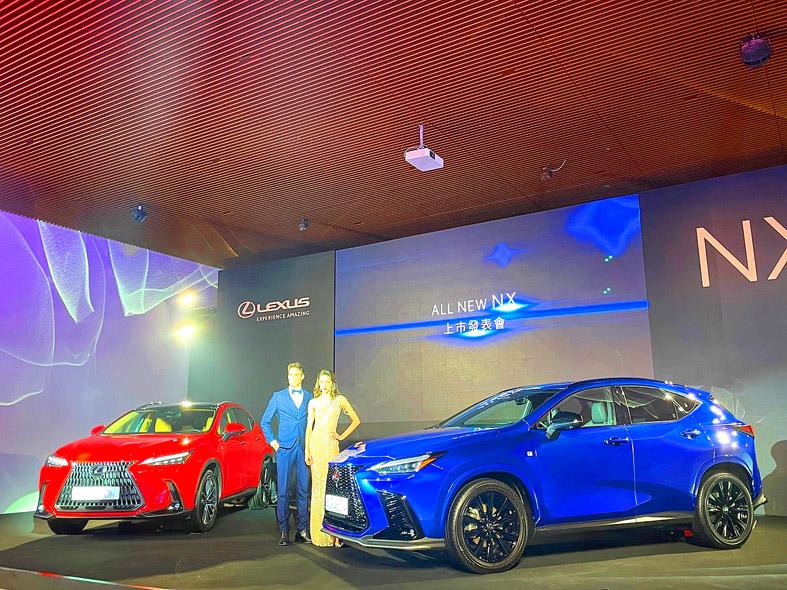Hotai Motor Co (和泰汽車), which distributes luxury Lexus brand vehicles in Taiwan, aims to sell 10,000 of the new Lexus crossover sport utility vehicles (SUVs) next year, given a surprisingly high number of preorders for the models, which come with either a gasoline or hybrid engine, it said yesterday.
Hotai said it has since the middle of last month received more than 3,000 orders for the revamped NX series vehicles, almost tripling the orders it received in 2017 for the previous models.
Toyota Motor Corp first sold the NX series in Taiwan in 2014.

Photo: Amy Yang, Taipei Times
“We are surprised by the strong preordering,” Hotai president Justin Su (蘇純興) said on the sidelines of the vehicle launch in Nantou County. “The growing popularity of SUVs in Taiwan helps.”
“We believe there is the potential to sell 10,000 units of the new Lexus NX series, but the supply of chips and other key components could curtail shipments,” he said. “But we are less affected by the chip crunch than others.”
It is likely to take at least three months for Lexus vehicle buyers to receive their cars, Su said.
Pent-up demand and economic growth are expected to push new car sales in Taiwan past 460,000 units next year, up from about 450,000 units this year, Su said.
Even after the impact of supply constraints on chips and other factors, Su said he adjusted upward his forecast from 440,000 units.
Hotai expects sales of its vehicles to grow next year from this year’s target of 145,000 units.
The five Lexus NX models launched yesterday include two hybrid vehicles, as Toyota has set the goal to electrify its lineup.
In September, Hotai introduced the first of its electric vehicles, the Lexus UX 300e.
The new Lexus NX models are priced from NT$1.63 million to NT$2.73 million.
Hotai has cut the prices to between NT$30,000 and NT$60,000 less than the preorder prices.

Taiwan Semiconductor Manufacturing Co (TSMC, 台積電) secured a record 70.2 percent share of the global foundry business in the second quarter, up from 67.6 percent the previous quarter, and continued widening its lead over second-placed Samsung Electronics Co, TrendForce Corp (集邦科技) said on Monday. TSMC posted US$30.24 billion in sales in the April-to-June period, up 18.5 percent from the previous quarter, driven by major smartphone customers entering their ramp-up cycle and robust demand for artificial intelligence chips, laptops and PCs, which boosted wafer shipments and average selling prices, TrendForce said in a report. Samsung’s sales also grew in the second quarter, up

On Tuesday, US President Donald Trump weighed in on a pressing national issue: The rebranding of a restaurant chain. Last week, Cracker Barrel, a Tennessee company whose nationwide locations lean heavily on a cozy, old-timey aesthetic — “rocking chairs on the porch, a warm fire in the hearth, peg games on the table” — announced it was updating its logo. Uncle Herschel, the man who once appeared next to the letters with a barrel, was gone. It sparked ire on the right, with Donald Trump Jr leading a charge against the rebranding: “WTF is wrong with Cracker Barrel?!” Later, Trump Sr weighed

HEADWINDS: Upfront investment is unavoidable in the merger, but cost savings would materialize over time, TS Financial Holding Co president Welch Lin said TS Financial Holding Co (台新新光金控) said it would take about two years before the benefits of its merger with Shin Kong Financial Holding Co (新光金控) become evident, as the group prioritizes the consolidation of its major subsidiaries. “The group’s priority is to complete the consolidation of different subsidiaries,” Welch Lin (林維俊), president of the nation’s fourth-largest financial conglomerate by assets, told reporters during its first earnings briefing since the merger took effect on July 24. The asset management units are scheduled to merge in November, followed by life insurance in January next year and securities operations in April, Lin said. Banking integration,

LOOPHOLES: The move is to end a break that was aiding foreign producers without any similar benefit for US manufacturers, the US Department of Commerce said US President Donald Trump’s administration would make it harder for Samsung Electronics Co and SK Hynix Inc to ship critical equipment to their chipmaking operations in China, dealing a potential blow to the companies’ production in the world’s largest semiconductor market. The US Department of Commerce in a notice published on Friday said that it was revoking waivers for Samsung and SK Hynix to use US technologies in their Chinese operations. The companies had been operating in China under regulations that allow them to import chipmaking equipment without applying for a new license each time. The move would revise what is known